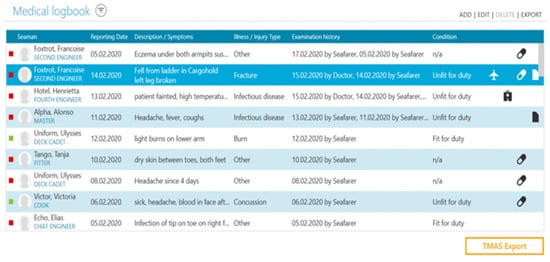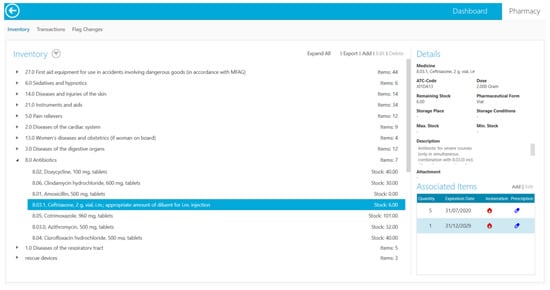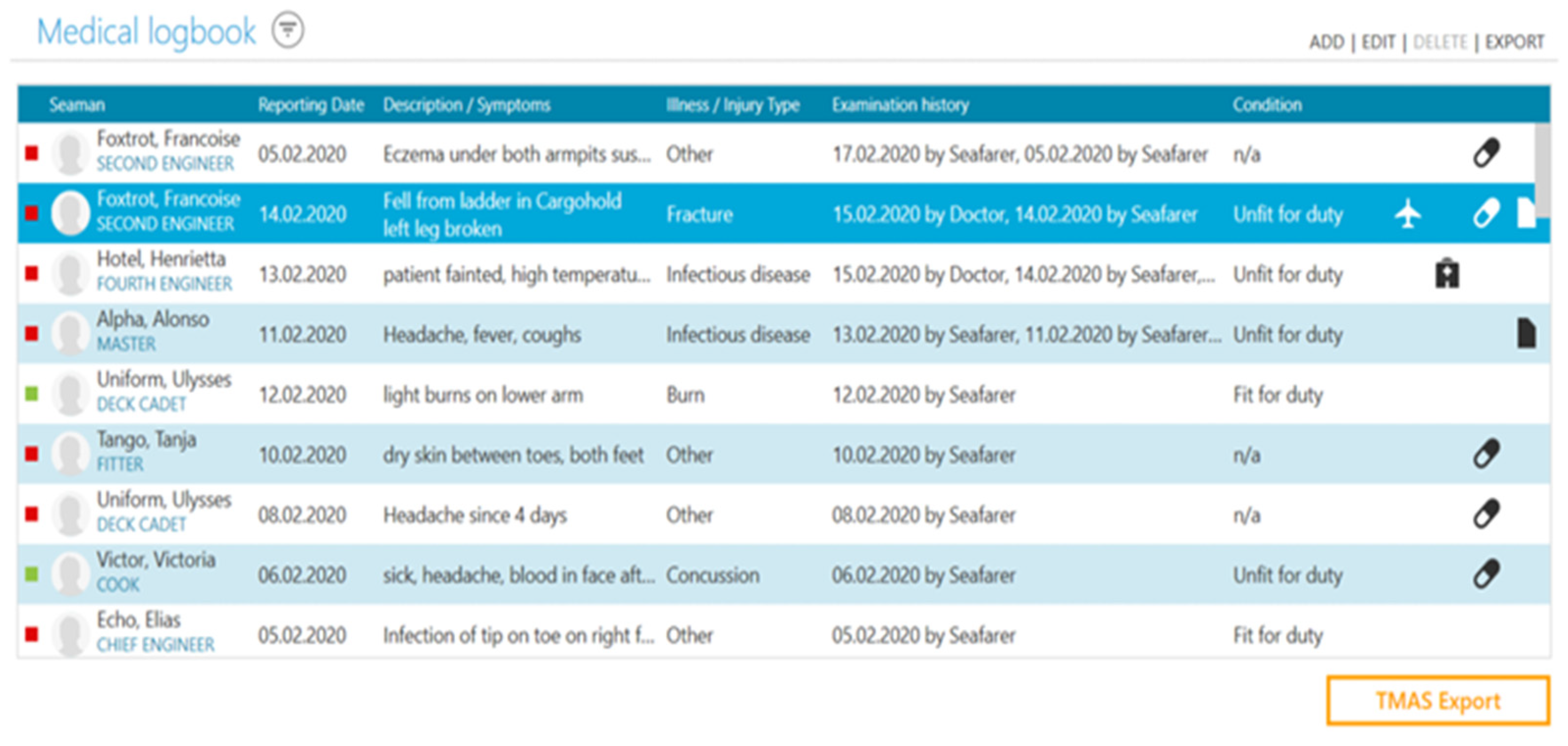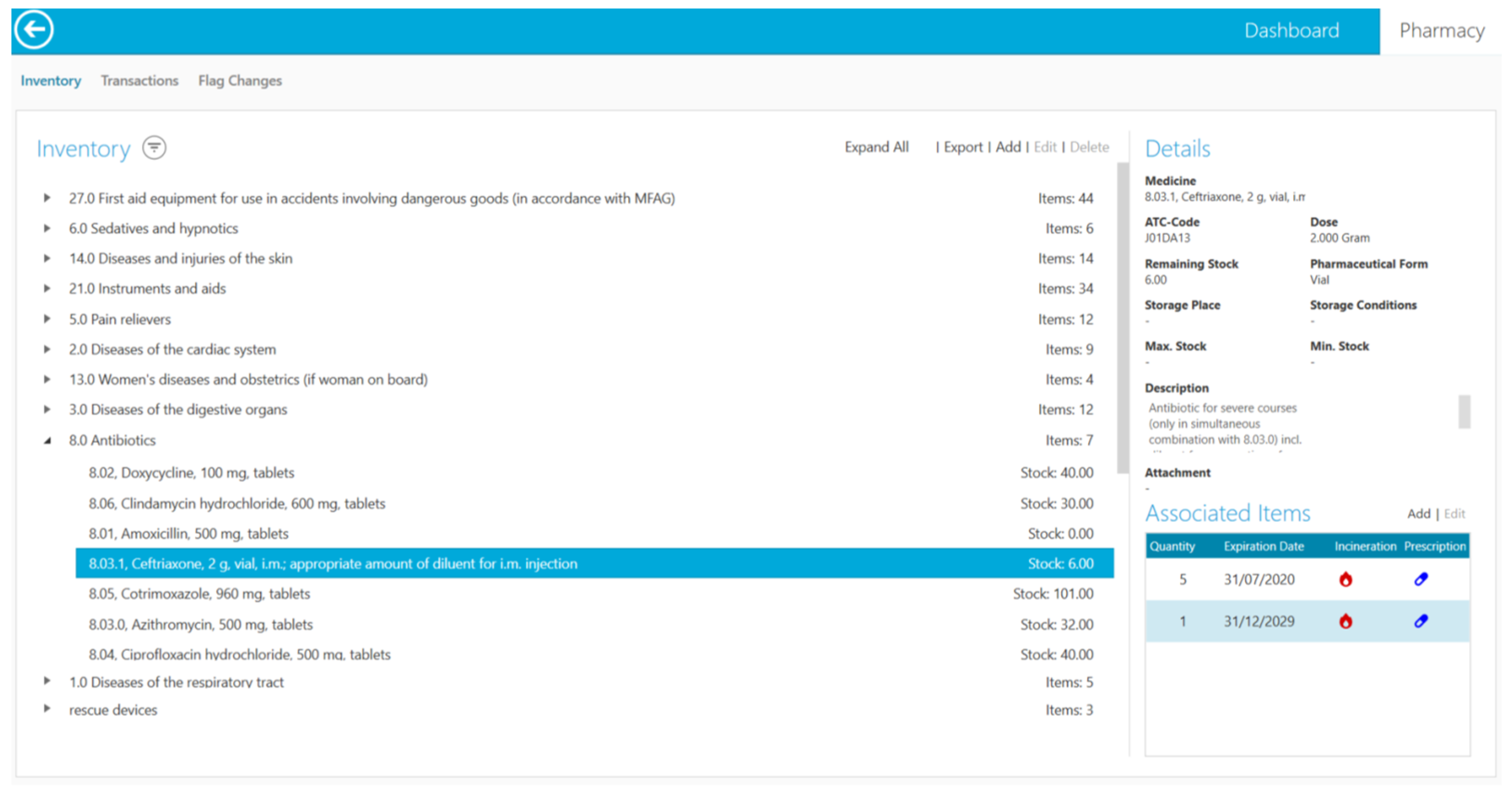Abstract
On Merchant vessels, there is usually no physician on board. Health management there is a great challenge for the responsible nautical officers. To simplify health administration on board diverse electronic health modules including a medical logbook and pharmacy module were developed in cooperation with an IT company. These modules are integrated in an existing fleet management system. The medical logbook and pharmacy modules were designed to offer more functions than just classic documentation and allow quick access to patient information. The included functions can support the nautical officer in his healthcare duties on the vessel.
1. Introduction
A great challenge regarding health management on merchant vessels is that all health care is performed by nautical officers. This duty and its extensive analogue documentation constitute an additional occupational burden aside from other nautical tasks. The introduction of different software modules shall make the documentation of medical work for the officer responsible for healthcare faster and easier.
2. Material and Methods
In cooperation with an IT company, diverse health modules were developed that are currently integrated in an existing fleet management system. The key modules are the digital medical logbook and pharmacy. Suggestions and requests of seafarers were considered for modules’ development.
3. Results and Discussion
The developed medical logbook module offers more functions than just classic documentation. Its most important advantage is the summary of several examinations in one entity to show the medical history of a case (Figure 1). There is also the option to attach documents and files to the entity (e.g., radiographs). Furthermore, it is possible to use a filter and sort function to quickly access older comparable cases or past examinations of a certain patient.

Figure 1.
Edited screenshot of the digital medical logbook with dummy data. Lines indicate case entities.
A linked connection to the pharmacy module automatically updates the pharmacy inventory when documenting the prescription of medication in the medical logbook. Besides containing medication inventories, the pharmacy module also warns the user if medication is about to expire (Figure 2). Other modules include the documentation of vaccinations and medical certificates. There is the possiblilty to export data either as a list of all examinations according to the paper versions of the classic medical logbook for port authorities or as one complete case, e.g., in case a patient visits a doctor in a port. The system also supports a semi-automatic creation of Telemedical Maritime Assistance Service (TMAS) protocols and forms for insurances.

Figure 2.
Edited screenshot of the digital pharmacy inventory with dummy data.
4. Conclusions
The included functions can simplify tasks for the nautical officer responsible for healthcare on the vessel. A preliminary version with dummy data has been tested on a merchant vessel for practicability and usability and is currently being optimized.
Author Contributions
Conceptualization, L.B., D.D., C.R., T.v.M., J.H., V.H. and M.O.; methodology, L.B., D.D., T.v.M. and M.O.; writing—original draft preparation, L.B.; writing—review and editing, L.B., D.D., C.R., T.v.M., J.H., V.H. and M.O.; visualization, L.B.; project administration, M.O. All authors have read and agreed to the published version of the manuscript.
Funding
This research was funded by the European Regional Development Fund (ERDF) and the Authority for Health and Consumer Protection of Hamburg.
Institutional Review Board Statement
Not applicable.
Informed Consent Statement
Not applicable.
Data Availability Statement
Not applicable.
Conflicts of Interest
The authors declare no conflict of interest.
Disclaimer/Publisher’s Note: The statements, opinions and data contained in all publications are solely those of the individual author(s) and contributor(s) and not of MDPI and/or the editor(s). MDPI and/or the editor(s) disclaim responsibility for any injury to people or property resulting from any ideas, methods, instructions or products referred to in the content. |
© 2023 by the authors. Licensee MDPI, Basel, Switzerland. This article is an open access article distributed under the terms and conditions of the Creative Commons Attribution (CC BY) license (https://creativecommons.org/licenses/by/4.0/).


